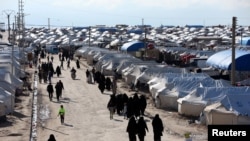Authorities in northeastern Syria have confirmed the region’s first death from the coronavirus, renewing fears the pandemic is about to make a devastating run through the war-torn region.
The Autonomous Administration for North and East Syria announced the death of a 53-year-old man from Hasakah city on Friday.
In a statement, officials said he had been brought to a hospital in Qamishli on March 27 and died less than a week later, on April 2.
The World Health Organization (WHO) confirmed the death in a report this week to the Syrian branch of the U.N. Office for the Coordination of Humanitarian Affairs (OCHA Syria).
Relative treated
The U.N. report said one of the man’s relatives has also been hospitalized in Qamishli with COVID-19 symptoms, and that test results are pending. Inas Hamam, a WHO regional spokesperson in Cairo, told VOA that active surveillance was ongoing across northeastern Syria for more potential cases.
According to the WHO, Syria has reported 38 cases of the coronavirus so far, including two deaths and five people who have recovered.
But Western intelligence officials believe that tally is far too low.
Kurdish officials in Syria’s northeast, as well as U.S. diplomatic officials, accuse the government of Bashar al-Assad and its ally Russia of hindering shipments of testing materials and medical supplies to the region, which is under the control of the U.S.-backed Syrian Democratic Forces.
In Friday’s statement, the autonomous administration also accused the WHO and the Syrian government of withholding critical information, saying they had known of the positive test result since April 2 but had said nothing, allowing the virus to spread.
“The Health Authority in northeastern Syria hold WHO responsible for a coronavirus outbreak among our people because the organization didn’t inform us about the case,” it said.
“The Syrian government is also concealing the truth about the number of coronavirus cases in its areas in Hasakah and Qamishli,” the statement added. “The Syrian government let travelers enter our areas from Qamishli airport without checking them for a possible infection.”
Earlier this month, the WHO admitted there had been delays in getting samples from Syria’s northeast to laboratories in Damascus for testing but said the issues had been resolved.
Fears for camps
The WHO, along with humanitarian aid groups, have long been worried about a potential coronavirus outbreak in northeastern Syria.
The area is home to several displaced-person and refugee camps, holding tens of thousands of people in cramped conditions.
The largest of the camps, al-Hol, has about 65,000 people, most of them the wives and children of fighters from the Islamic State terror group, which controlled the region until March of last year.
The SDF also oversees about 10,000 captured IS fighters, including about 2,000 foreign fighters, in a series of makeshift prisons scattered across the region.
Disease and sickness have been common in the camps and the prisons, and fears of the coronavirus are blamed for a prison riot in Hasakah last month.
Earlier this month, a senior State Department official said the U.S. was “working desperately and urgently” to get supplies to northeast Syria to help stave off a possible outbreak.
U.S. military officials say they have already delivered more than $1.2 million worth of medical supplies, including latex gloves, masks, surgical kits, defibrillators and oximeters.
More is on the way.
“We are coordinating an additional delivery of medical supplies to help our anti-ISIS partners prevent COVID-19 from spreading to the people of northeastern Syria and ISIS detainees,” a U.S. official told VOA.
Even with such efforts, researchers and aid groups fear the coronavirus pandemic is likely to hit the region hard, even if reporting has lagged.
“If we don't have numbers, it doesn't mean that there are no cases,” said Randa Slim, director of the conflict resolution program at the Middle East Institute.
“There are many factors that are prohibiting people from reporting cases if they are infected,” she said. “The refugees and the IDPs are the least prioritized communities for testing in these countries.”
Lack of travel
Philippe Nassif, with Amnesty International USA, said the lack of international travel to Syria, and northeastern Syria in particular, might also have played a role in the slow spread of the virus.
“You know, you don't have a flight from Paris to Damascus, for example,” he said. "You're going to have a slower spread of the virus initially. But once it arrives, it arrives, and then you have a really big problem.”
Other countries in the region, including some with close ties to Syria, are already being hit hard.
Iran, with more than 79,000 reported cases and almost 5,000 confirmed deaths, has become an epidemic hot spot.
U.S. officials have accused Iran’s Islamic Revolutionary Guard Corps and proxies, like Lebanese Hezbollah, which are active in Syria, of helping to further spread the virus.
Nisan Ahmado contributed to this report.







